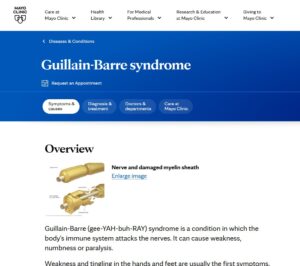The Mayo Clinic’s Guillain-Barré Syndrome (GBS) resource offers a clear, medically reviewed explanation of this rare but serious neurological disorder. Guillain-Barré Syndrome occurs when the body’s immune system mistakenly attacks the peripheral nerves, leading to muscle weakness, numbness, and, in severe cases, paralysis. Though the exact cause is unknown, GBS often follows an infection such as the flu, a gastrointestinal illness, or—less commonly—a vaccination or surgery.
The Mayo Clinic outlines the key early signs of GBS, including tingling in the feet or hands, progressive weakness in the legs and arms, and difficulty with coordination. These symptoms typically worsen rapidly over days or weeks and may affect breathing, heart rate, or blood pressure, making prompt medical attention critical.
This guide details the types of GBS, such as acute inflammatory demyelinating polyradiculoneuropathy (AIDP), the most common form in the U.S., and less common variants like Miller Fisher syndrome. It also explains how GBS is diagnosed through physical exams, nerve conduction tests, spinal taps, and lab work.
Treatment information includes the two primary medical therapies: plasma exchange (plasmapheresis) and intravenous immunoglobulin (IVIG), both aimed at reducing the immune system’s attack on the nervous system. Most patients require hospitalization and supportive care during the acute phase. Rehabilitation may be needed during recovery, which can take weeks to years.
The Mayo Clinic emphasizes that early intervention improves outcomes and that most people recover, though some may experience lasting weakness or nerve damage. The page also addresses possible complications and when to seek emergency care.
This comprehensive resource is especially helpful for patients, caregivers, and healthcare professionals looking for trusted, easy-to-understand information on Guillain-Barré Syndrome from a leading medical institution.

